
by Mark Smiley | Apr 27, 2018 | General Featured
by Glen Richardson

Veteran Newsman: Award-winning broadcaster Steffan Tubbs joined the lineup on Newstalk 710 KNUS radio this year.
Popular radio newsman Steffan Tubbs who anchored 850 KOA’s Colorado Morning Show for over a decade has joined 710 KNUS after the most challenging period of his life. Tubbs texted a highly confrontational girlfriend while intoxicated. She had previously been arrested for harassing him. She turned over the text messages to the Denver Police and he was arrested on July 30, 2017. He was charged with “domestic violence” by telephone with the legal authorities declaring that he used “vulgar language with the intent to annoy the victim.” He spent 36 hours behind bars until finally being brought before a judge.
His arrest photo led the evening news on FOX 31 News and he watched his life fall apart. He was suspended by KOA Radio and he saw friends and business acquaintances disappear. He credited his legal counsel with standing up for him when almost nobody other than his family, particularly his children, were willing to do so. All charges were dropped by the Denver District Attorney in October 2017. Notwithstanding the dismissal, KOA refused to rehire him and he found no one willing to give him an opportunity.
That was until 710 KNUS morning host Peter Boyles had him fill in for him and went to bat for him at the station. When Dan Caplis the evening drivetime host at the station retired to spend more time with his family and his highly successful law practice, Tubbs applied for the job.
He is now: “A longtime newsman, now with an opinion….” That’s the introduction you hear on Newstalk 710 KNUS radio at 4 p.m. every Monday through Friday as the veteran broadcaster begins his program. The “Steffan Tubbs Show” is on weekdays from 4 to 7 p.m.
“I thought I’d had dream jobs before,” Tubbs says. “But I’m absolutely loving my new position at 710 KNUS. I’m truly blessed. After 30 years as a newsman, I’m in a learning phase of how to incorporate news with talk. I value the opinions of o
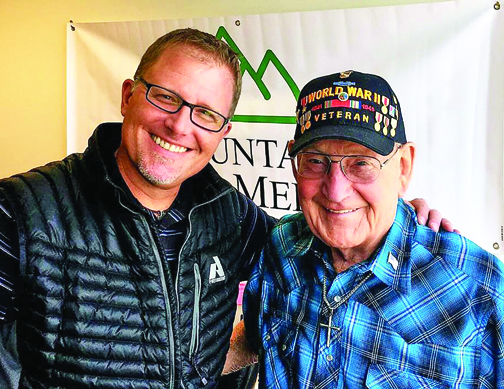
Advocate For Veterans: Steffan Tubbs is a strong advocate for veterans. He was an embedded journalist with American troops in Iraq on several occasions. Here, he is pictured with U.S. Army WWII veteran Bill Brunger.
thers and even if we disagree I think we can have productive dialogue in a civil way.”
Tubbs has 30 years of news experience. He spent more than six years as a national correspondent with ABC News based in Los Angeles, and then moved to the other coast where he worked as a reporter and anchor for FOX5-TV in New York City. Tubbs says he returned to Denver in 2005 and for the next 12 years hosted the morning drive news program on KOA NewsRadio.
Tubbs has covered some of the most important stories not just in Colorado, but also throughout the country and the world. “I reported on the Oklahoma City bombings and subsequent trials, Columbine and 9/11,” Tubbs says. “As well as every type of natural disaster including fires and hurricanes, floods and earthquakes, drought and tornadoes.”
Tubbs’ broadcasting experience expands into sports as well. He reported on multiple Super Bowls, World Series, NBA and Stanley Cup finals and even the 2002 Winter Olympics in Salt Lake City. His numerous awards are a testament to the quality of his work. Tubbs is a four-time winner of the Edward R. Murrow Award for national reporting, he’s received several Colorado Broadcasters Association awards and has twice been named best radio personality in Denver.
Tubbs also has a documentary film company where he says he funnels his passion for real, honest storytelling. His films focus on military men and women, who he proudly supports.
Tubbs says, “I end my show every day by reminding us the remember our troops.”

Drive Time: The Steffan Tubbs Show can be heard Monday through Friday from 4 p.m to 7 p.m. on Newstalk 710 KNUS radio.
The Steffan Tubbs Show launched in February of this year in the crucial afternoon drive time slot on Newstalk 710 KNUS. Tubbs says, “I am blessed and truly love what I’m doing in this new chapter of my career with 710 KNUS.”
His show rounds out the other top-rated programs including the Peter Boyles Show from 5 to 9 a.m. Monday through Friday and the Chuck Bonniwell and Julie Hayden Show weekdays from 1 to 4 p.m.
Newstalk 710KNUS has led the coverage of the Denver Mayor Michael Hancock scandal and Tubbs says, “I think the Hancock scandal is a perfect example of how real news can be combined with the comments and questions of our audience.”
Tubbs adds, “I know we’re not reinventing the wheel with yet another new talk show but that said — I really think we have a unique opportunity to do a news program that integrates callers and opinion.”
A proud dad of two teenage boys, Tubbs notes he is very engaged on social media and loves to tweet and use Facebook posts before, during and after the show. You can follow the show’s Twitter @TubbsShow or @SWTubbs as well as The Steffan Tubbs Show on Facebook.
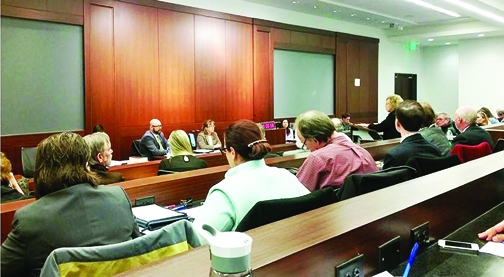
by Mark Smiley | Apr 27, 2018 | Main Articles
Reforms To Help Homeowners Blocked By Powerful Lobbyist CAI
by Ruthy Wexler

LAC: Members of CAI’s Legislative Action Committee, which acts as lobbyists for HOAs and their supporters, meets with Colorado lawmakers to discuss upcoming bills. CAI has repeatedly blocked all reform legislation to aid homeowners.
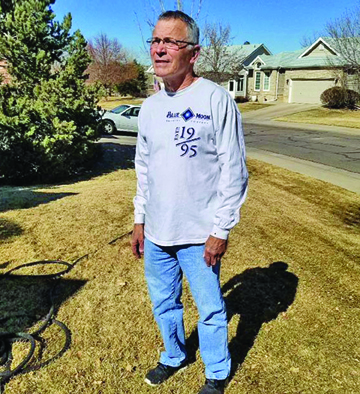
Advocate: Stan Hrincevich started the Colorado HOA Forum, his advocacy group for homeowners. An HOA Town Hall with lawmakers is scheduled for Tuesday, May 22, 2018, 5:30-8:30 p.m., Aurora Central Library, 14949 E. Alameda Parkway, Large Community Room.
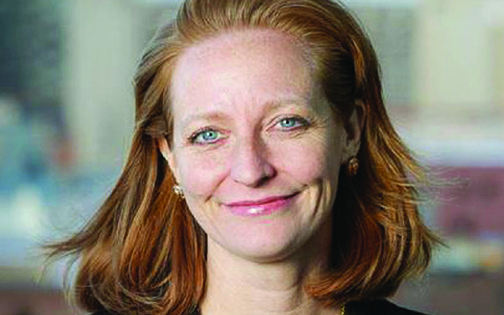
Voices For Reform: Notwithstanding important and influential community voices such as former Colorado Senate President Morgan Carroll, left, and former longtime news anchor and now author Ward Lucas, right, demanding that reforms be made to the abusive power of Colorado HOAs, CAI has prevented any and all reforms to aid homeowners. Some highly frustrated advocates have begun discussing strategies to bring suit against CAI or organize boycotts against the Rocky Mountain chapter.
Homeowner Associations (“HOAs”) are of increasing importance to homeowners in Denver and across Colorado. HOAs are set up to govern condominium associations and the common areas within condominiums. In single family home areas HOAs are set up to enforce covenants and to oversee common areas such as pools, tennis courts etc. which may be owned by the association as a whole.
Denver HOAs are also set up to advocate for neighborhood concerns even where the homes in the neighborhood are not covenant restricted or have common areas to oversee. These unique type HOAs in Denver may have their own challenges, but are not the subject of this article.
In Colorado, over 60 percent of the population lives with common interest HOAs, but in Colorado and across the country individuals and families have discovered that these HOAs can be highly oppressive with individuals and families having little recourse under Colorado law to prevent or limit those abuses. Any and all reforms advocated by individual homeowners to curb abuses are shot down at the Colorado legislature by a power lobbying group titled Community Association Institute — Rocky Mountain Chapter (“CAI”).
Catch-22
At first glance, it seems that Colorado has made progress in protecting homeowners. In 1992, after years of complaints, the state passed The Colorado Common Interest Ownership Act (CCIOA), a comprehensive package setting guidelines for HOA conduct, adding more statutes in 2005. In 2013, after a particularly high wave of grievances, CO lawmakers considered the “HOA Reform Act,” which Denver’s television station CBS 4 predicting the legislation would “rein in the powerful HOA industry.”
Resulting laws set stricter standards in matters like debt collection and foreclosure, as did additional 2015 statutes.
But all these laws lack one essential piece: any enforcement mechanism for individual homeowners.
No Exit
HOAs do not fall under any regulatory a gency or higher authority. Even Colorado’s “HOA Office” (HOA Information and Resource Center, established inside Department of Regulatory Agencies [DORA] in 2011 to help homeowners) is authorized only to receive complaints, not act on them.
gency or higher authority. Even Colorado’s “HOA Office” (HOA Information and Resource Center, established inside Department of Regulatory Agencies [DORA] in 2011 to help homeowners) is authorized only to receive complaints, not act on them.
Thus, an aggrieved Colorado homeowner’s only option is still: hire an attorney and take your HOA to court.
Not only is court very expensive, says former state senator Morgan Carroll, but “because HOA attorneys have access to unlimited funds (including homeowners’ dues and reserves),” homeowners have been given short shift in most Colorado courtrooms.
Shocked Into Advocacy
In 2012, Stan Hrincevich, suspecting financial irregularities, requested records from his HOA, which refused. Knowing CCIOA gave homeowners the right to view all records, Hrincevich sued his HOA. In discussions, HOA lawyers deemed Hrincevich’s position correct. “But the only way they’d agree to rectifying the situation was if I paid court costs. Then, back in court, the judge ruled in favor of the HOA. And told me to pay the costs!”
Galvanized, Hrincevich started Colorado HOA Forum, an advocacy group whose website offers a wealth of information, most of which Hrincevich can spout on a dime. The issue he speaks about most is enforcing existing laws — by installing, under DORA, “an out-of-court, binding dispute resolution process.”
It’s not just Hrincevich asking. The HOA Office has received “thousands” of homeowner requests for some “affordable, non- adversarial” way to get justice.
In their 2013 Report to the Legislature, the HOA Office showed that such processes work well in the two states, Florida and Nevada, that have installed them. The report concludes, “To restore equality “[Colorado] should establish a binding Arbitration Program for HOA disputes.”
In 2013, Hrincevich urged lawmakers to incorporate the report’s recommendation. So did then-Senator Carroll, who, with colleague Su Ryden, proposed an Ombudsman solution. “We tried to get an enforcement piece [in those laws]. We couldn’t get the votes.”
Hrincevich recalls, “I’d go down to the Capitol [in 2013] and tell [lawmakers], ‘There’s nothing accessible and affordable for the homeowner to enforce a complaint.” Fighting him, however, was the powerful lobbying group the Rocky Mountain chapter of the national CAI. The CAI was founded in 1974 by the National Association of Homebuilders, the Urban Land Institute, federal governmental agencies, savings and loan associations and 23 builders/developers. It has chapters across the United States and internationally. Today it is viewed by critics as an avowed enemy of everyday homeowners and citizens and just one more special interest behemoth to which many legislators appear beholden across the county.
Who Is CAI?
CAI is who State Senator Angela Williams meant when she said, “Dispute resolution is tricky in Colorado. There’s a lobby.”
“CAI is one of the most powerful lobbying groups in the country,” explains longtime Denver investigative journalist and television new
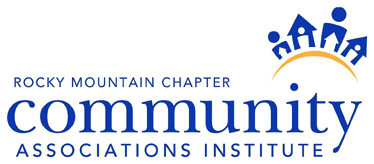
Widely Despised Organization: Homeowners throughout Colorado have come to loathe the Rocky Mountain Chapter of the Community Associations Institute as an unscrupulous special interest group harming families and individuals throughout the state.
s anchor Ward Lucas, “benefitting lawyers and [management companies] t
hat work for HOAs.”
“CAI is down at the Capitol all day, every day,” says Carroll. “Especially if they don’t like a bill.”
“If you have legislation that even hints of regulatory oversight,” says Carson Horton of Capital Reserve Consultants, “[CAI] is there … fight[ing] it to the death.”
Hrincevich says he finally got lawmakers to understand that CAI does not represent homeowners. “But they still allow CAI to write legislation.”
Asked if that were true, Colorado CAI Board President Denise Haas replied, “Our Legislative Action Committee interacts on a day to day basis with lawmakers to protect HOAs. We … help craft legislation that gets the most for HOAs.”
Flawed
Haas insists that the system works for homeowners because homeowner-elected boards make decisions.
In his book, Neighbors at War: the Creepy Case Against Your Homeowners Association, Lucas lists many the pitfalls that make homeowner boards a “fundamentally flawed” system. “Neighbors shouldn’t have that much power over neighbors,” says Lucas, who describes how the board’s unlimited power often results in “rogue” boards that leave homeowner interests far behind.
Most board members begin sincerely, says Professor Evan McKenzie, author of Privatopia, “but are unprepared to make complex construction or financial decisions.”
If boards “make decisions,” what do management companies do?
“They educate and guide boards,” replied Haas. “… put the right people in front of them.”
In one Aurora condominium complex, a management company “guided” the board to sign a contract giving the company 3-5 percent of any construction project done on the property (supposedly for “supervision” but no qualified staff ever showed up). In a Denver condominium complex, the management company repeatedly recommended the same disappointing landscaper.
“People need to understand, it’s a business,” Haas explains.
It’s A Business
HOAs are a very big business. The number of HOAs in the U.S. jumped from 10,000 in 1970 to 338,000 in 2015. In 2016, $10 million in Transfer Fees alone flowed from 9,200 Colorado HOAs, with $85 billion in Assessments collected from U.S. homeowners. CAI’s website brims with financial opportunities for HOA vendors — while the list of homeowner horror stories grows.
“We lost all our health and wealth,” said an Englewood, Colorado couple, their home foreclosed due to $9,000 in HOA penalties over a misplaced trash can.
A frightened Denver woman received continual “cease and desist” letters from attorneys after she criticized her HOA.
A Texas woman was foreclosed upon when she couldn’t pay a $15,500 “special assessment” — though just previously, her HOA spent $650,000 on new manager and guest suites, including furniture bought from the board president’s business.
How do HOAs get away with such?
“The way HOAs are legally structured, they can do pretty much anything they want,” says Carroll, explaining that HOAs function exactly like governments but “are exempt from the checks and balances we expect — because they’re set up as corporations.” People have trouble absorbing this, says Lucas, because we grow up believing that if we purchase a home, we’re safe inside it.
Fear
CAI insists trouble comes only from homeowners who “don’t obey rules.”
“Ten percent of homeowners create controversy,” says Haas, adding that unhappy homeowners can simply vote in a different board.
Not so simple, says an elderly Denver woman. “Everyone here is busy working or old and tired like me.”
“I bought this condo to retire,” says a businesswoman, who, like others, refused to be named for fear of reprisal. “Now I can’t relax, waiting for the next crazy rule they make up.”
There are many HOAs that don’t abuse power. Some, like Windsor Gardens, hire a professional General Manager.
But buyers who don’t want HOAs will have a hard time in Colorado, where almost all new construction, even upscale single-family, is registered by developers as HOA.
Cities love HOAs, says CAI’s Dawn Bauman, “because they save a lot of money … transferring municipal obligations to the homeowner association.” Plus “the 2.3 million workers [volunteer board members] we give cities for free.”
Hrincevich and other homeowner advocates believe that the Colorado legislature needs to look beyond powerful lobbying groups like CAI and provide rights and remedies to individual homeowners to address the abuses of HOAs as have happening in many other states.
For information about Hrincevich’s homeowner group, visit www.colorado hoaforum.com. For information about the Rocky Mountain Chapter of the CAI, visit www.cai-rmc.org.













